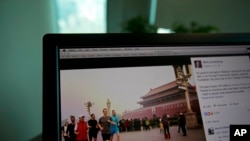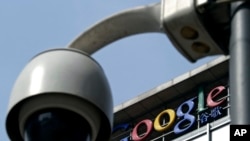Facebook has agreed to work with Vietnam’s government to block certain social media content the country says violates its laws.
The deal came during a recent visit to Hanoi by Facebook’s Head of Global Policy Management, Monika Bickert.
Facebook agreed to directly coordinate with Vietnamese officials to limit illegal or offensive material, according to the Ministry of Information and Communications. The company also promised to remove fake accounts and false information posted about senior government officials, the ministry said.
According to Vietnamese officials, some accounts break laws against crimes such as violence and child abuse. Others are illegal because they violate the privacy of people and organizations.
A ministry announcement quoted Bickert as saying Facebook was committed to working with Vietnam to jointly “build a healthy and safe online environment.”
Vietnam has a history of restricting public comments that are critical of the government. In the past, Vietnamese police have arrested people for posting anti-government writings online.
A Facebook representative told Reuters news agency the company has a clear process for governments to report illegal material. Requests to remove content are reviewed to make sure local laws and Facebook’s terms of service are followed.
Facebook puts out public reports twice a year on government requests it receives. Some of the requests involve government investigations or criminal cases. Others seek to remove content that violates local laws.
In its latest report covering a six-month period through June 2016, Facebook reported there were no Vietnamese government requests for content restrictions.
Industry experts estimate Vietnam already has more than 35 million Facebook users. That number is expected to reach 45 million – nearly half the county’s current population - by 2021.
Facebook’s agreement with Vietnam strengthens its position in one of Asia’s fastest growing economies.
Will this deal help Facebook get in China?
The company has also expressed interest in doing business in China – the world’s largest internet market with more than 721 million users. But getting approval will be difficult because China greatly restricts internet material. Just last week, Beijing announced new, stronger rules for online news content.
Rogier Creemers is an expert in Chinese policy and law at the University of Leiden in the Netherlands. He says Facebook’s deal with Vietnam could help its future efforts to enter China.
“Certainly from the Facebook side, I think there will be a fair bit of effort to present this Vietnam deal as a potential precursor for a deal with China. The question is how the Chinese side will respond to that.”
Creemers says China sees the internet as potentially a very dangerous place that needs to be policed. He said even the last U.S. presidential election showed some of the problems the internet and social media can cause.
“The American election ironically just confirms that belief that social media can be a hotbed of fake news, uncontrollable information circulation beyond the bounds of what can be acceptable to a state.”
Nigel Cory is a trade policy expert at the Washington-based Information Technology and Innovation Foundation. He says the Chinese government has successfully worked with social media services already operating in China. But Facebook may find it difficult to balance its business operations with many new rules it would need to obey.
“The bigger question is establishing enough trust on both sides and enough understanding for Facebook of exactly what the parameters are that they would be able to operate in. And where the lines are drawn, how they're drawn, and how Facebook works with the local authorities.”
Cory said other U.S. technology companies – including Google and Twitter – have also struggled to do business in countries that restrict speech and information.
“The challenge Facebook is facing in Vietnam is similar to the challenge it and other U.S. tech companies are facing around the world, when responding to the concerns of local governments about material they host online. And it's a challenging one.”
Google was operating in China but pulled out in 2010 after disagreements with Beijing over restrictions on content. In recent years, the search engine has reportedly held talks with China about returning to the market.
Rogier Creemers said even if Facebook does get approval, he’s not sure how effective it will be competing against China’s existing social media services.
“Is anybody waiting for Facebook access in China? There’s a couple of really good social network services out there. And Facebook would start from a position of considerable disadvantage. So even if it were allowed in China, there's no guarantee that it would be successful.”
I’m Bryan Lynn.
Bryan Lynn reported on this story for VOA Learning English, with additional material coming from Reuters news agency and other sources. Hai Do was the editor.
We want to hear from you. Do you think governments should have the right to restrict content on social media platforms such as Facebook? Write to us in the Comments section, and visit our Facebook page.
________________________________________________________________
Words in This Story
offensive – adj. very unpleasant, likely to make people angry or upset
fake – adj. false, not true
account - n. a company’s record of products or services used
precursor – n. something that comes before something else and can influence an outcome later
ironically – adv. something different from what is expected
circulation – n. movement of information or things
parameter – n. a limit that controls the way something is done
disadvantage – n. something that makes a situation more difficult or less likely to succeed









